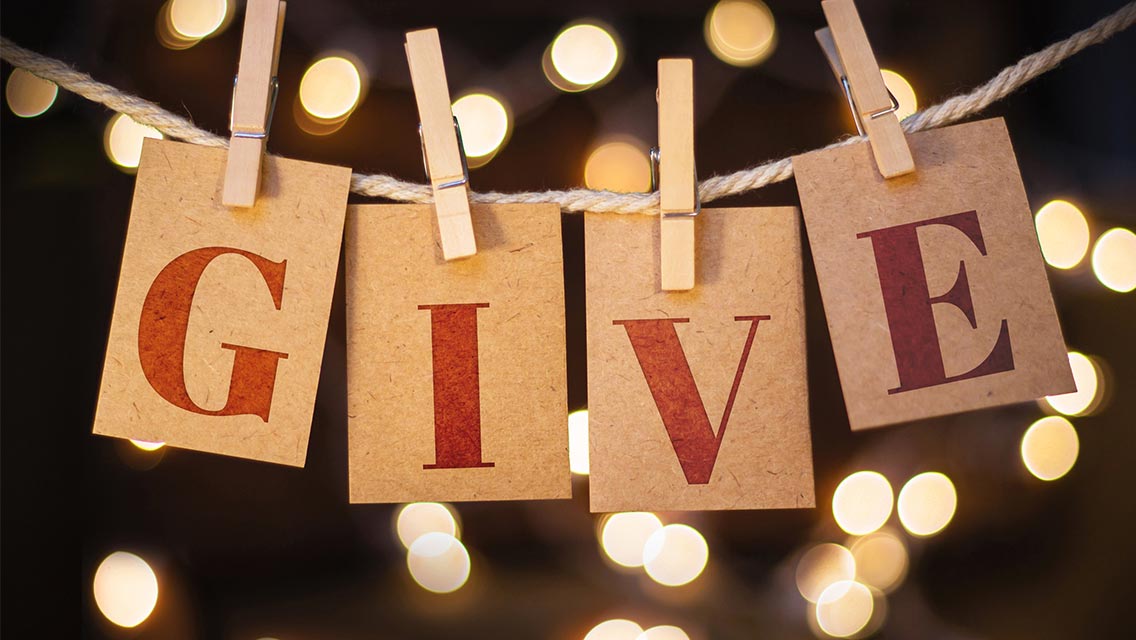For those who want to improve their lives by virtually every measure, social scientists offer surprising advice: Give away as much as possible.
People who generously contribute their time, money, and kindness are healthier, happier, and more confident than those who do not, according to research from the University of Notre Dame; the University of California, Berkeley; and other academic institutions.
“Being generous has a host of positive effects — everything from making you more socially networked and physically active to preventing depression,” says Notre Dame sociologist Hilary Davidson, PhD, coauthor of The Paradox of Generosity. Written with sociology professor Christian Smith, PhD, the book compiles insights gleaned from the Science of Generosity Initiative, which tracked the spending habits and lifestyles of 40 families from different classes and races over a five-year period.
“Acting generously causes neurochemical changes in the brain, increasing the pleasure response,” Davidson explains. The result is circular: The more satisfied and directed you feel in life, the more generous you are. “It becomes an upward spiral.”
The relationship between generosity and well-being is so strong that the opposite is also true: Selfishness can be self-destructive, says Smith. When University of Queensland researchers asked study participants to play a bargaining game that tested the effects of selfish decision-making, they found stingy players had higher stress levels than those who acted generously. “As we say in the book, it’s no accident that the word ‘miserly’ and the word ‘miserable’ are related,” says Smith.
According to researchers, generosity can improve your life in some surprising, health-enhancing ways.
Health Booster
“When people act from compassion to care for others, they live longer, have better health, and are happier rather than the reverse,” says Dacher Keltner, PhD, codirector of the Greater Good Science Center at UC Berkeley and author of Born to Be Good and The Power Paradox: How We Gain and Lose Influence. Keltner cites studies showing that caring for others in need activates the vagus nerve, a key neural pathway that slows the heart rate, boosts immune function, and decreases the inflammatory response.
Generosity can also reduce the negative effects of stress. In a recent study published in the journal Health Psychology, researchers gave participants a sum of money and instructed them to spend it on themselves or on others. The results were convincing: Those who gave generously to others experienced a significant lowering of blood pressure. “The drop in blood pressure was the equivalent of what you might see from starting a new aerobic-exercise program,” says lead author Ashley Whillans, a PhD student at the University of British Columbia.
While this was just one small study, it was the first to demonstrate a causal effect, says Whillans.
Confidence Builder
If you’ve been going through life feeling like you aren’t making much of a difference in the world, focusing on helping someone else or a cause can boost your self-esteem. “When you put some elbow grease into something, you realize you’re someone who can get things done, and it’s very gratifying,” says Davidson.
And because generous behavior often entails moving beyond your comfort zone and developing new skills — whether that’s coaching soccer, helping in a community garden, or becoming a museum docent — it increases your sense of self-efficacy. “We know that learning and expanding our knowledge is also deeply connected with happiness and mental satisfaction,” Davidson adds.
Finally, giving helps you see yourself as an agent of change; it builds confidence and increases optimism. It also helps you meet new people and develop new connections in your community. “One of the things we know for certain is that the wider and broader our social networks are, the more positive we feel and the more satisfied we are with our lives,” she says.
Joy Maker
Research has consistently found that generosity can be a powerful tool for improving moods and even combating depression. “Imaging studies have shown that the same pleasure centers in the brain that are activated by sex and food are activated by giving,” explains Keltner.
In a 2008 study exploring the emotional health benefits of donating money, researchers from Harvard Business School and the University of British Columbia gave participants cash, instructing half of the group to spend it on themselves and the other half to purchase gifts for others. Those who shopped for others consistently reported more joy than those who spent the money on themselves.
Giving doesn’t just feel good; it also gets you out of your own head, which can help when you’re feeling down. “A surefire way to feel better when you’re blue is to shift the focus away from yourself and onto others, and that’s what generosity does,” says Keltner.
You also gain a different outlook when you see inside the lives of others, Davidson says, pointing to one of her interview subjects who suffered from fibromyalgia. “Pain was quite present in her life, but in volunteering she was able to take a step away from it and put it in perspective,” she says.
Grow Your Generosity
Being motivated by the needs of others — rather than the personal benefits of being charitable — is a key factor in enjoying the many perks of generosity. In other words, you can’t fake it and still reap its rewards.
You can, however, more genuinely contribute your time, money, and talents. “Generous impulses can be learned, and it’s exhilarating when you just get out there and try it,” says Notre Dame sociologist Hilary Davidson, PhD, coauthor of The Paradox of Generosity. To get started, she suggests taking stock of your resources — looking at time as much as money — and finding small ways these resources might be used for the good of others. Consider these ideas:
Start small. Make an extra pan of lasagna for a sick friend, buy a cup of coffee for the next person in line, share your pocket change, or just give someone a hug or pat on the back. (Touch is a powerful, direct way to give; it releases oxytocin, which promotes trust, cooperation, and sharing.)
Join a team. Paint the sets for a school play, coach a Little League team, get involved in a community improvement organization, work a phone bank, or team up with others to clean up a beach or local park.
Support a cause. Volunteer at a soup kitchen, run a 5K to fight cancer, walk dogs at a local shelter, attend (or chair!) a fundraiser for your child’s school, collect groceries for a local food bank, or make an annual pledge to a charity close to your heart.
Spread the love. Trumpet the arrival of a friend’s book or gallery show, be understanding with a cranky spouse, give a coworker credit for a good idea, organize a party for a friend, or drum up support for a local event.




This Post Has 0 Comments